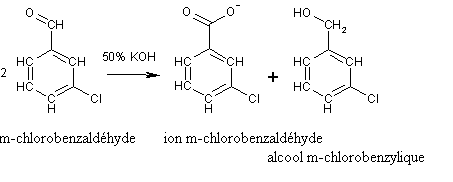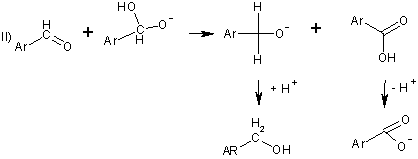Réaction de cannizzaro
- Réaction de cannizzaro
-
Réaction de Cannizzaro
La réaction de Cannizzaro est la dismutation d'un aldéhyde sans hydrogène sur le carbone en alpha en présence d'une base forte formant un alcool et un sel d'acide carboxylique.
Par exemples:
- Dismutation du formaldéhyde en méthanol et formiate
- Dismutation du benzaldéhyde en alcool benzylique et en benzoate
- Dismutation du m-chlorobenzaldéhyde en l'ion m-chlorobenzaldéhyde et en alcool m-chlorobenzylique:
- Le formaldéhyde peut jouer le rôle de réducteur comme dans la transformation du vératraldéhyde en alcool vératrique:
Dans le cas d'un aldéhyde avec un hydrogène sur le carbone en alpha, nous aurions une condensation aldolique. Des marquages isotopiques ont montré que la réaction se fait en deux étapes:
Lorsque deux aldéhydes sont mis en réaction, on parle de réaction de Cannizzaro croisée . Elle donne tous les produits possibles. Cependant, si un des aldéhydes est le formaldéhyde, la réaction produit seulement un formiate et l'alcool correspondant à l'autre aldéhyde. Il s'agit alors d'une réduction par le formaldéhyde.
Une variante est la réaction de Cannizarro-Tichtchenco:
 Portail de la chimie
Portail de la chimie
Catégorie : Réaction d'oxydo-réduction organique
Wikimedia Foundation.
2010.
Contenu soumis à la licence CC-BY-SA. Source : Article Réaction de cannizzaro de Wikipédia en français (auteurs)
Regardez d'autres dictionnaires:
Reaction de Cannizzaro — Réaction de Cannizzaro La réaction de Cannizzaro est la dismutation d un aldéhyde sans hydrogène sur le carbone en alpha en présence d une base forte formant un alcool et un sel d acide carboxylique. Par exemples: Dismutation du formaldéhyde en… … Wikipédia en Français
Réaction de Cannizzaro — La réaction de Cannizzaro est la dismutation d un aldéhyde dépourvu d hydrogène sur le carbone en alpha de la fonction carbonyle, en présence d une base forte formant un alcool et un sel d acide carboxylique. Elle tient son nom de Stanislao… … Wikipédia en Français
Cannizzaro — Stanislao Cannizzaro Stanislao Cannizzaro Stanislao Cannizzaro, né à Palerme le 13 juillet 1826 et mort à Rome le 10 mai 1910, est un chimiste italien. Biographie En … Wikipédia en Français
Cannizzaro reaction — The Cannizzaro reaction, named after its discoverer Stanislao Cannizzaro, is a chemical reaction that involves the base induced disproportionation of an aldehyde lacking a hydrogen atom in the alpha position. [cite journal author = Cannizzaro, S … Wikipedia
Cannizzaro , Stanislao — (1826–1910) Italian chemist Born the son of a magistrate in Palermo, Sicily, Cannizzaro studied physiology in his native city and at Naples. He turned to organic chemistry after realizing the importance of chemical processes in neurophysiology,… … Scientists
Cannizzaro, Stanislao — ▪ Italian chemist Introduction born July 13, 1826, Palermo, Sicily, Kingdom of the Two Sicilies [Italy] died May 10, 1910, Rome, Italy Italian chemist who was closely associated with a crucial reform movement in science. Education and early … Universalium
Cannizzaro reaction — Can·niz·za·ro reaction (kahn″e tsahґro) [Stanislao Cannizzaro, Italian chemist, 1826–1910] see under reaction … Medical dictionary
reaction — 1. The response of a muscle or other living tissue or organism to a stimulus. 2. The color change effected in litmus and certain other organic pigments by contact with substances such as acids or alkalies; also the property that such substances… … Medical dictionary
cannizzaro reaction — |kanə|zä(ˌ)rō , nət|sä noun Usage: usually capitalized C Etymology: after Stanislao Cannizzaro died 1910 Italian chemist : a reaction of aldehydes with caustic alkali in which one molecule of aldehyde is reduced to the corresponding alcohol and… … Useful english dictionary
Cannizzaro reaction — the reaction which certain aldehydes may undergo in concentrated alkali; one molecule of the aldehyde is reduced to the corresponding alcohol and another molecule is simultaneously oxidized to the salt of a carboxylic acid … Medical dictionary








